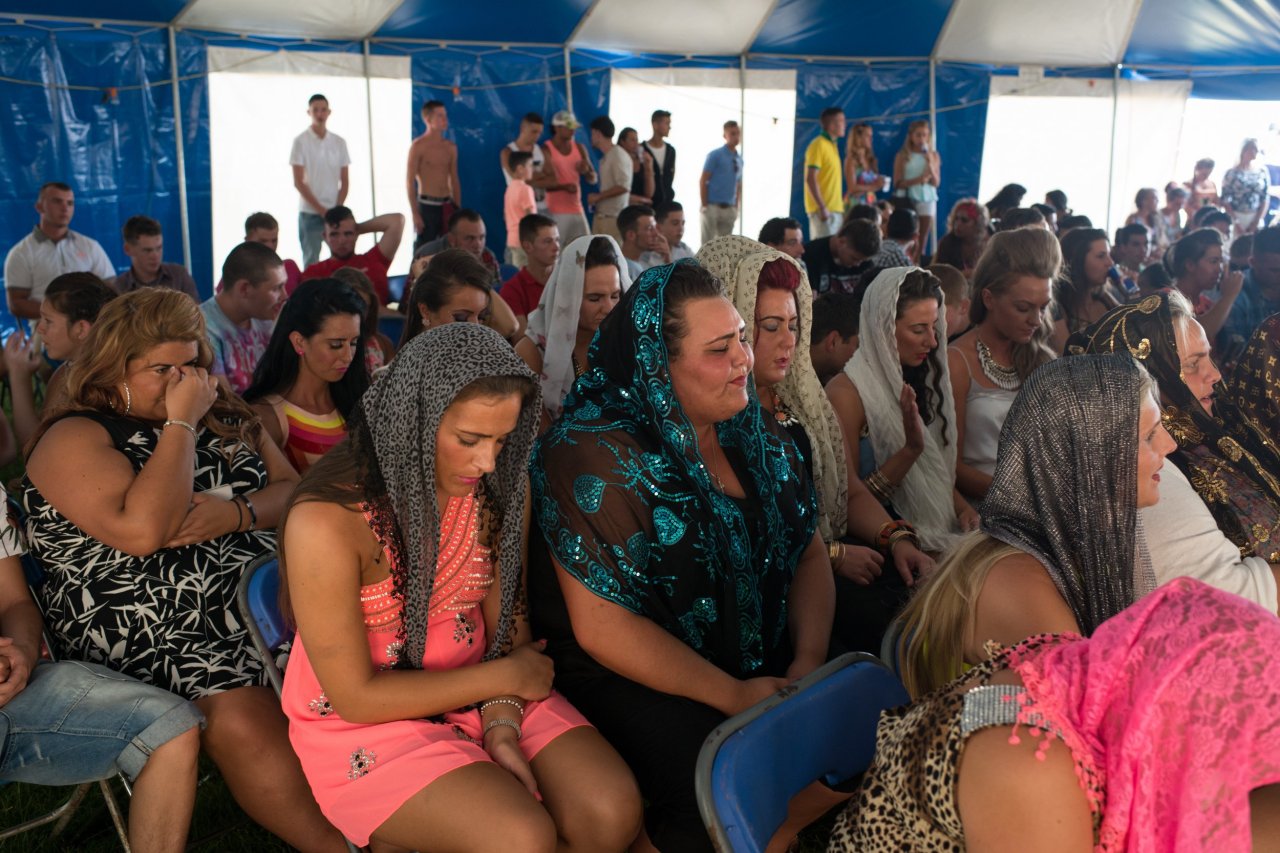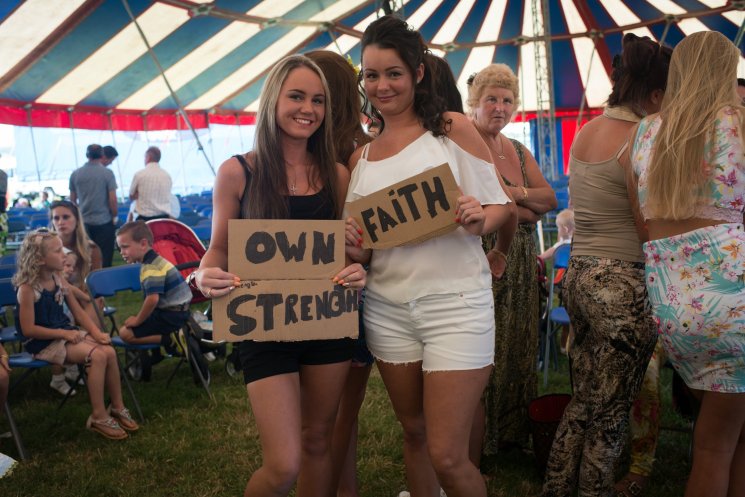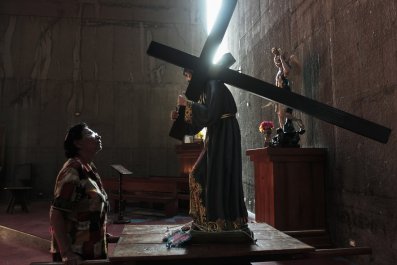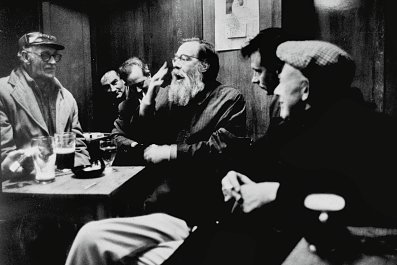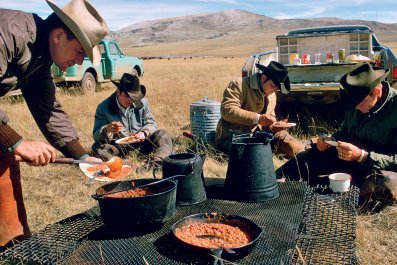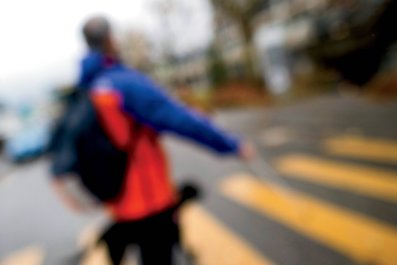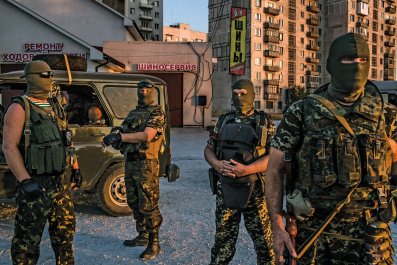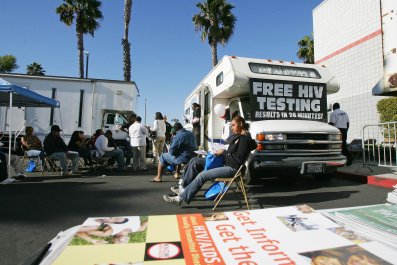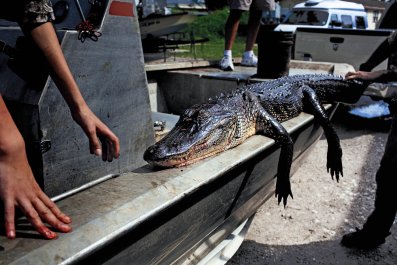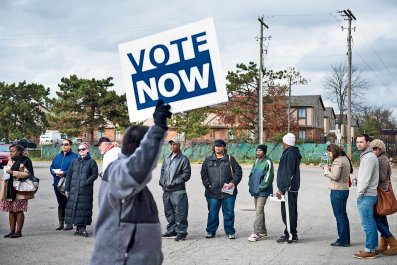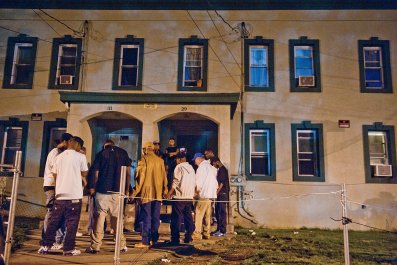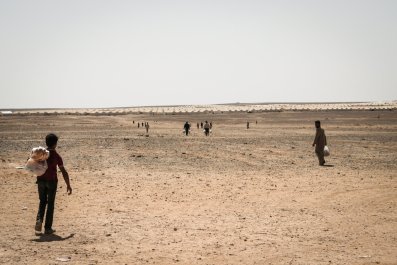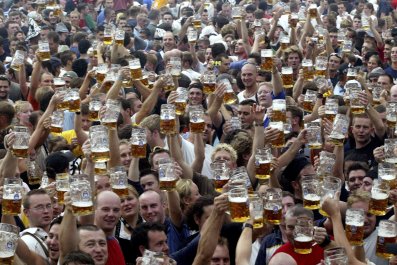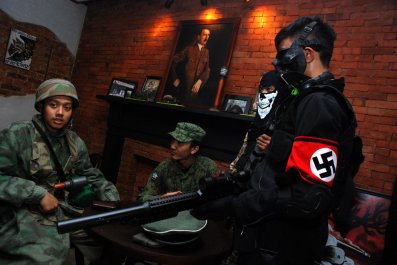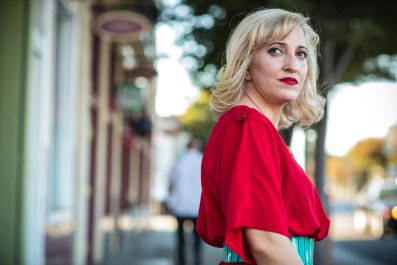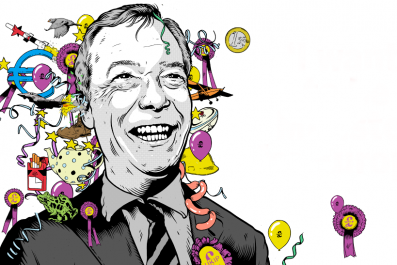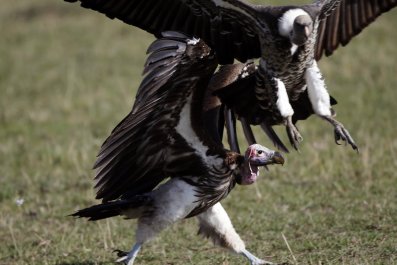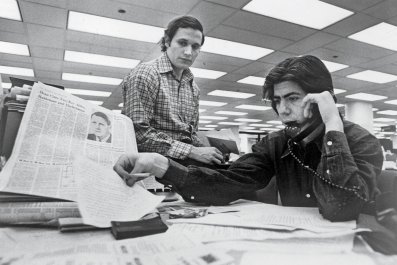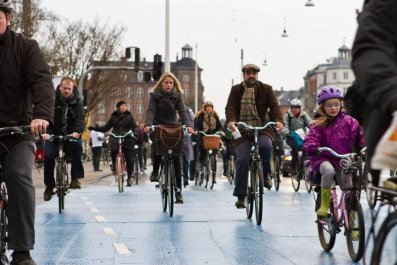In early June, every year, for many generations, Gypsies and Travellers have travelled to the Appleby Horse Fair in Cumbria in their thousands, crossing the moors and fells on their journey in old painted wagons or modern trailers, on roads that their ancestors travelled before them. This journey is what sherar rom (or elder) Billy Welch, the organiser of the fair, and a Romani Gypsy, calls, "our Mecca, our pilgrimage".
His choice of words is telling. In recent years there has been a revival of a fervent Christian faith that first stirred amongst the Gypsy people in England in the 19th century. Now it has taken root once again, and is spreading fast, across Europe and as far as afield as Latin America and India.
That faith, and the principal church that sustains it – known as Life and Light in the UK – has meant that Romani identity, both in the UK and abroad, is starting to change.
Across a Europe where politicians are seen to have lost much moral authority, in a reversal of roles it is the Roma people who now see themselves as the saved, the preachers of the truth, who want to heal a world they see as broken by lack of faith.
On that fine June Sunday morning, high up on Fair Hill, the Gypsy evangelical church Life and Light was to hold a meeting at Appleby Fair itself. This made perfect sense to Welch, although he is of Church of England stock.
"I think it's wonderful that more and more of our people are turning to the Lord," he said, looking out over the verdant Lake District fells. "It's beautiful to know that the Lord walks amongst us at Appleby Fair. This is sacred ground to us, in God's own country."
As he talked, Gypsy men, women and children gathered for the open-air service, around a burnt-out campfire, to be held on a stage where young people had sung and danced the night before. Five pastors from the community had driven from their own churches around the country to minister to their people, at the biggest gathering of Romani and Traveller folk anywhere in the world – several thousand in all.
Brisk trading continued below, in the market field, in Crown Derby and other tableware, smocked dresses for girls and tweed for boys, and, of course, Shetland ponies, donkeys and the much-loved Gypsy horse, the cob with its feathered feet, with blood lines stretching back generations. Horses trotted down the flashing lane in sulkies, or light-weight traps, the owners showing off a straight line in the traces and a high-trotting step. But up on Fair Hill, the faithful had gathered to come to their Lord.
Pastor Alan Boswell, who led the service, was brimming with enthusiasm: "This felt like the right time to us," he said. "We want the whole fair to hear our message. This is where we should be." He bounded onto the stage; guitar over his shoulder, to lead the congregation in a number of heartily-sung gospel songs, resonant of those from the American Deep South. He led the faithful in "prayers for this field"; everyone sang that their "shackles [were] gone". "Have you got your ticket?" he asked his flock, as he led them in a favourite gospel song, "This train is bound for glory, this train". Other pastors took part too. One, Joe Mitchell, brandished his black leather Bible against a glowering sky, "God is interested in your sin. He died for you, the Gypsy people. You need to repent. Where do you want to go? Heaven or hell?"
'The gypsy awakening'
There had been religious services at Appleby from the 1930s till the 1970s, according to local historian and town mayor, Andy Connell, but they were led by local Methodist or "Assemblies of God" ministers, rather than Gypsy pastors. Life and Light, by contrast, is a church for the Gypsy people, led by them. It is changing everything that we think we know about the communities, reinventing and redrawing the image of the Roma, Gypsy and Traveller people throughout Europe.
They are presenting a new face to the outside world – one of forceful moral and political authority, as they seek to free their people from prejudice and poverty. This is a story of emancipation, similar to that of the Baptist church in the American Deep South, led by civil rights and religious leader, Martin Luther King.
The movement has spread from Brittany throughout France, into Spain, Portugal, Belgium, Holland, South America, Scandinavia, Britain and Eastern Europe. Around one third of all French Gypsies are now thought to be Pentecostal Christians – with about the same proportion in Spain and Portugal. Further east, in the former communist bloc, many Roma are Pentecostals (although not all belong to Life and Light, as there are a plethora of Romani evangelical churches in Eastern Europe). In Britain, nearly every Gypsy family has at least one Life and Light convert (often leading, in tight-knit families, to other conversions) and the movement is evangelising in the Irish Traveller community. In Britain, many newly-arrived Roma are also enthusiastic Pentecostals.
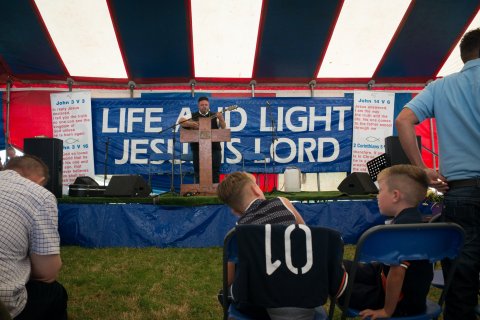
The church has, effectively, two starting points – one English and one French. The former is rooted in primitive English Methodism and the Salvation Army, and a much-revered man called "Gipsy Rodney Smith", but the more recent starting point, in living memory, is that of a quietly-spoken, non-Romani French pastor and roads engineer, Clément Le Cossec and his sons. Le Cossec had founded an evangelical church, Vie et Lumière, in Brittany, in northwest France and Paul Le Cossec, one of his eight children, now a missionary in India with Gypsies there, recalls: "My father had received a prophecy about reviving the Gypsy people." When he converted a family of Romanies in Finistère, Brest, in 1952, the act became known as "the Gypsy awakening".
The movement spread fast. Le Cossec realised that if his mission to the Gypsies was to succeed, he had to train pastors from within the community to speak to their own people. The "Apostle to the Gypsies", as he became known, was by a nature a delegator – happy for others, including Holocaust survivors such as the Romani writer, Matéo Maximoff, who lost 27 members of his family, to become pastors to their own flock. Many of those who converted in Brittany were survivors of concentration and internment camps, both in France and further afield. In France alone, between 3,000 and 6,000 Roma are thought to have been interned, and others were shipped to German concentration camps. Some survivors gave passionate testimonies at early meetings; they had lost their families in the camps, but the church was providing them with a new one.
Le Cossec saw Gypsies and the Jewish people, traumatised survivors of the Holocaust, as chosen ones. Because they had been outcasts, he said, they were "better believers" than gorgia, or non-Gypsies. There is still a cherished belief among evangelical Gypsy Christians, that they are a tribe of Abraham, lost thousands of years ago in the Sinai desert, rather than descended from ancestors in North-West India, as linguistic and genetic analysis suggest.
Le Cossec always tailored his Gospel to his congregation, encouraging them to think of themselves as a stateless people, who now had a celestial homeland where they would no longer be persecuted and where they could throw off the perceived stigma of their ethnicity. He preached that: "up there, there are no 'Forbidden to Travellers' or 'No Stopping' signs". And he was aided by the rhythms of Gypsy jazz – Django Reinhardt was a relative of the pastor Matéo Maximoff, and his music became much favoured within the church (although he never became a convert himself).
Gypsies had been evangelised before – in Victorian times, enthusiastic do-gooders thought that they could save Gypsies from what they considered a "depraved" nomadic lifestyle. A number of Gypsy preachers emerged, the most famous being Rodney Gipsy Smith, who became a preacher with the Salvation Army, travelling to spread the word to the US, South Africa, Australia and even to the front-line during the First World War. His name still resonates today, with tracts about his life handed out at horse fairs and religious meetings.
Spreading the faith
Welch jokes that Darlington is the "Gypsy capital of England", because it's thought that at least one-third of the population may have Gypsy ancestry. He lives there today, with his extended family, as did his father before him. For many years the family lived on the Honeypot Lane caravan site – and it was here that Welch senior brought the Le Cossec family and held a tent meeting, back in the 1970s, on their first mission to England.
Welch remembers: "My dad went to France to visit the church members with my cousin, Davey Jones. Then my dad brought them back – and they had a big marquee tent, out the back, the first one in the country. It all began on Honeypot Lane caravan site." Davey Jones would go on to become the church's first pastor in England – the man who grounded and rooted the French church here.
Two years ago, I interviewed Davey Jones at Appleby Fair, in his chrome caravan, about the amazing spread of his church: "Life and Light has been called the silent revival," he said. "In the last few years we have opened 27 large churches in this country alone. My people were in spiritual darkness. Now many of them are experiencing a personal relationship with God for the first time."
He told me more then about the practices of the church, in which, like other Pentecostal churches, believers perform baptisms by full immersion, speak in tongues and believe in miracles. The church discourages alcohol and drugs. More controversially, long-held Gypsy customs, such as fortune-telling and arranged and teenage marriage, are also challenged.
Jones's wife, Nora, came from a long line of fortune tellers but gave up when she became a Christian. "My wife could take herself all over the world and tell fortunes, but she couldn't read," Jones said. "It was only when she was converted that she wanted to read the Gospel. Christianity is hitting the road and making a social difference. Our young people want to study and they want to learn the language of their own people so they can speak to them. Proper Romanies just want to do business, so they have had no need for education. After they become Christians they want to learn."
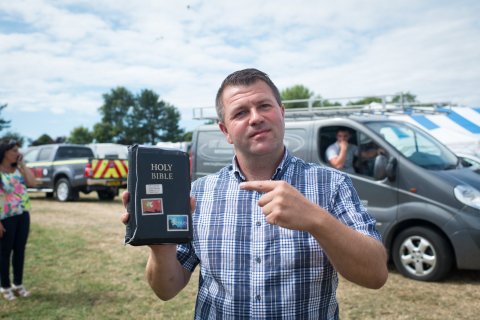
Jackie Boyd, who leads much of the church's missionary work abroad, says the church retains what is good about Romani culture but jettisons other parts: "In our culture there are some good things, such as the family ties and the respect we have for them. But we used to have cultural jobs like fortune telling that go against the word of God. It's only things that come against the word of God that need to change."
The horse fairs, at the beating heart of Gypsy culture, where Romanies meet, woo, deal and shop, have become the Pentecostal gathering points. I first heard about the church when I was visiting Stow Horse Fair, in the Cotswolds, where there is usually a prayer meeting to bless the fair, led by Siddy Biddle and his family, on the evening before it opens. At the meeting in autumn 2012, Siddy led the small number of faithful in prayer, around a campfire, with battered hymn books and blackened kettles boiling on sticks for tea afterwards. Gypsies there, as at other meetings, talked about their faith in an open and simple fashion – but Life and Light's challenges to a traditional way of life can prove hard.
One well-respected woman, who had converted, told me: "I've read fortunes all my life and I goes out hawking still, I like to keep it going, the pegs, the favours, the table-cloths, it's lovely. I like to talk to people, tell them who I am, what I am, it's a way of life. I don't want to change it."
I asked her what the Church had said to her about fortune-telling. "We have a gift, if you can talk to a person and say things are going to be better, you are not doing anything bad. It's a gift from the Lord but some of the Christians say it's from the Enemy."
Some Romani scholars have misgivings at the prohibitions that the church is imposing. Professor Ian Hancock, at the University of Texas, sees the bans on fortune telling and arranged marriage as "gross cultural imposition", saying that the first ban has caused women financial problems and that arranged marriage is part of many cultures, including that of the Roma people. The church has become attractive to many, however, because it allows Romanies a real voice. "Roman Catholic and Orthodox churches are very impersonal, and some have refused to allow Romanies inside to pray. The born again churches allow Romanies to have a say, and titles and even become pastors with churches of their own."
The New Missionaries
The annual conventions, both in France and in the UK, have become hugely popular as a place for Romanies to come together – not only to worship but to meet as families, as the old nomadic ways fall into abeyance. In France as many as 25,000 Romanies from across Europe gather every year in late summer to worship, with the flags of their countries fluttering across a circus tent that can hold thousands.
For the past few years, the English Life and Light Romanies have also held missions. In June 2012, I travelled to Selby, in north Yorkshire, to see a convention at the invitation of Pastor Jones. It was twice the size that he had expected – several thousand people turned up – to the fury of the Selby locals. But it was free of serious trouble (few Gypsy Christians drink or smoke) and the local shops did a roaring trade in staples such as milk, bread and sweets, to the evident despair of the tabloids. It was a little like a horse fair – relaxed and cheery – but with a devout tinge.
Two years on, I travelled north again, this time with Ciara Leeming, a photojournalist who has made friends with Roma through her work, to the village of Overton, near Lancaster, to visit another Life and Light convention. As before, people were hostile to the meeting – one councillor, Keith Sowden, said he had tried hard to get it banned, but without success, mainly because he had feared traffic disruption and litter. Sowden need not have worried. As we travelled towards the meeting, Gypsy men were at work in the verges, picking up every tiny bit of litter that might have come from the site.
The meeting, of some 700 caravans, and perhaps 3,000 or so souls, was, if anything, more fervent than two years previously – and extremely well ordered. At first sight it appeared like a gigantic camping and caravanning site. Only the highly-polished stainless steel churns at the doors of the caravans – and the Christian fish signs on the cars – gave something away.
Janie Codona, an influential English Gypsy, who has been a member of the church for decades, explained the importance of the meetings. "It's very difficult for us to travel any more," she said. "Life and Light events are one space where people can come together. There's a very serious side to it, with the fellowship, and the worship, but there's also the social side, particularly for the young people."
The big tent, during the services, was completely full. At least half the women were wearing headscarves, or would pull them over their heads at moments of prayer. Men and women gave testimonies – heartfelt tales of their lives before they were saved and after, a key component of the Pentecostal experience. The sermon had a distinct Gypsy feel to it. The pastor talked of his congregation as people who restored things, of his childhood, and that of others of his generation, building toys out of scrap, how that differed from the experience of their much more prosperous children.
Outside, I saw Jones and his wife, Norah, for the first time since Appleby. He had just come back from a mission in Ireland. "The Catholic church is dying there", he said, mainly, he judged, because of the high profile clerical sex abuse scandals, some victims of which were Irish travellers. This had left a void in the lives of travellers, which Life and Light could fill, he thought. Davey, along with Jean Le Cossec, one of Clément's sons, had filled buildings with Irish Travellers in Cork, Dublin and Belfast. Although much smaller than the missions in England – or France – he could see something stirring in Ireland that he had not imagined would happen in his lifetime. We were standing outside the big tent as the afternoon service drew to a close and I asked him: "Did you ever think, when you brought Life and Light to England, 40-odd years ago, that it would grow like this?" Davey looked at the tent behind us, full of his people, praying, and shook his head. "We were just a few then, I had no idea. But that is God's work, not the work of men. I never thought that this movement would spread like fire in so many countries, all at once. Look at England, France, Ireland, Russia."
Our souls were ripe for saving too. Many times that day, pastors came up to us, asking if we would take Jesus into our lives. These were men with a mission, who had cast off the age-old separation between gorgia and Gypsy, who were ready to assume moral authority over our souls, because of their deep faith.
One big crying match
Some of the younger Gypsies wanted us to see their work – building up a thousand-strong youth ministry – in a smaller tent, later in the afternoon. Although one young man said, quite plainly that "women are servants", they do play an influential role in the church.
Capella White is a respected member of the church in Scotland, who credits her role, somewhat paradoxically, to having been left when she was pregnant and then becoming a single parent. Historically, being a divorced parent would have been frowned on in the Gypsy and Traveller community, but she says that the church has not turned her away, instead allowing her to demonstrate that her faith has brought her, protected, through hard times. White defends the church's position on women preachers: "There is a brother for everybody", she says, "We are one big family. It would be one big crying match if women were preaching."
Codona agrees: "We have a role, what you might call the typical role within the Gypsy and Traveller community, supporting each other, praying for one another, also cleaning and providing coffee, sometimes having a fast prayer for someone for whom we are praying. I suppose what is actually happening fits in with the culture of the people who attend the meetings, and that's why it works."
Mary Ann Sheridan, a young Irish Traveller, who converted in the summer of 2011, is the grand-daughter of Mary Ann McCarthy, the first member of a Traveller community I interviewed, back in 2006, at the largest encampment of British nomads, at Dale Farm in Essex. Like her grand-daughter, McCarthy had converted to the Life and Light church from the Catholic faith she had followed all her life, shortly before a notorious and violent eviction of Travellers from Dale Farm in October 2011.
Three years later, Sheridan tells me that Catholicism had not changed the Traveller way of life as she feels it should have done. She has watched young people go to mass and then take drugs, drink, steal and join gangs. "Life and Light changed my life when I gave my life to Jesus. You don't need to run to drugs or drink when you have Jesus. That's the difference."
Father Dan Mason, the Catholic priest who saw his congregation at Dale Farm splinter as Life and Light recruited there, in that bleak summer before the 2011 eviction, is both self-critical and critical of Life and Light: "We need to raise our game. There are some priests who feel that Travellers are a pain, that they are disruptive," he says. "That is the appeal of churches such as Life and Light, because they can spend time with people like themselves, it is a form of separatism."
Damian Le Bas, a Romani journalist who studied Theology at Oxford University, has mixed feelings. "I don't like the fact that it is being presented as a corner
stone of our culture, and it is in conflict with some of our traditions, such as fortune telling. You do not have to be a Pentecostal to be a Gypsy. But I can see that it is having a rehabilitative effect on lots of Traveller men in particular. I have my intellectual beliefs, but no one can deny that the church is increasingly influential. There are certain sites now where you couldn't probably even live if you weren't a Pentecostal – there are some with churches on site. The conventions are very significant – they continue Gypsy culture in a way that is more acceptable to the general public."
Into the establishment
Just how acceptable Gypsy Christian culture is becoming was demonstrated by a chance meeting at the Lancaster convention with Joe Boswell, a Life and Light pastor at Dartford, in Kent. A couple of years ago, Boswell was asked to start leading Bible studies for a prayer group in the House of Commons, at the heart of Westminster. All over Europe, Life and Light believers and pastors are articulating a self-confident political and moral voice, at national and European level. As academic David Thurfjell explains, the Roma people do not have a homeland, state or army, "so the sense of identity is linked to Pentecostalism, and is intertwined with the influence of Romani rights activists. The Pentecostals are a uniting force."
A number of Life and Light pastors have become Council of Europe experts on Gypsy and Traveller issues – including May Bittel from Switzerland and René Zaneletto, from France. Zaneletto is a gorgia, who married a Roma and is now a leading international figure in the church and at European political level. And despite the carefully delineated role of women in Life and Light, perhaps the most powerful Romani Pentecostal within European institutions is Miranda Vuolasranta, a Finn, who is now an expert on discrimination within the Justice Directorate of the European Commission. Of the four groups of delegates representing Roma and Travellers in Europe consulted by the Council of Europe, Life and Light and other Roma churches appoint one. This blurring of boundaries between religion and politics may seem confusing, but it is, in fact, a natural consequence of a vacuum of power for the Roma people that the church has filled – providing orphanages in Russia, for example, or improving slum housing conditions in the former eastern bloc. Roma gospel singers in Finland, for example, are part of an emancipatory movement that has led to an improvement in conditions for the Roma at social and political level.
Adrian Marsh, a Romani academic who studied the church across Europe for his book Romani Pentecostalism: Gypsies and Charismatic Christianity, a collection of essays edited with David Thurfjell, sees the movement as increasingly influential across Europe.
"The key emphasis of Life and Light is its approach – it reaches out to the poor and the dispossessed," he says. "There are connections between Pentecostalism and political voices. The International Romany Union is dominated at points by Pentecostal pastors. The state will deal with them, because they are seen as reliable, godly, more respectable. They are the voice of the community and the politicians' voice."
Marsh also sees certain historical resonances: "There are parallels – with the Southern Baptists in the US, with the young Desmond Tutu, that's where some of this comes from. There isn't yet an adoption with liberation theology as you have seen in Latin America, but that kind of potential is there. In Sweden, where there has been a truth and reconciliation commission about the way in which the Romani population has been treated, the group on it were Pentecostals".
Gregor Dufunia Kwiek, a Swedish Romani academic and activist says: "As far as ethnic identity is concerned, there are Roma who see Pentecostalism as an obstacle to Romani culture. I see it as a 'newer' Romani identity."
Katherine Quarmby's in-depth ebook Romani Pilgrims: Europe's New Moral Force is available now through Newsweek Insights.



